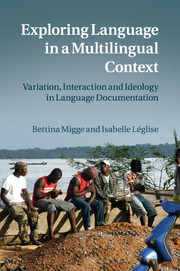26 results
13 - Creoles and Variation
- from Part II - Legitimacy, Authority and the Written Form
-
-
- Book:
- The Cambridge Handbook of Language Standardization
- Published online:
- 01 July 2021
- Print publication:
- 22 July 2021, pp 371-394
-
- Chapter
- Export citation
Isabelle Buchstaller, Anders Holmberg, & Mohammad Almoaily (eds.), Pidgins and creoles beyond Africa-Europe encounters. Amsterdam: John Benjamins, 2014. Pp. vi, 178. Hb. €95, $143.
-
- Journal:
- Language in Society / Volume 44 / Issue 3 / June 2015
- Published online by Cambridge University Press:
- 25 June 2015, pp. 438-441
- Print publication:
- June 2015
-
- Article
- Export citation
Robin Sabino, Language contact in the Danish West Indies: Giving Jack his jacket. Leiden: Brill, 2012. Pp. xix, 337. Hb. $156.
-
- Journal:
- Language in Society / Volume 42 / Issue 5 / November 2013
- Published online by Cambridge University Press:
- 11 October 2013, pp. 579-582
- Print publication:
- November 2013
-
- Article
- Export citation
Contents
-
- Book:
- Exploring Language in a Multilingual Context
- Published online:
- 05 November 2012
- Print publication:
- 01 November 2012, pp v-vi
-
- Chapter
- Export citation
Acknowledgements
-
- Book:
- Exploring Language in a Multilingual Context
- Published online:
- 05 November 2012
- Print publication:
- 01 November 2012, pp xi-xii
-
- Chapter
- Export citation
Index of subjects, languages and locations
-
- Book:
- Exploring Language in a Multilingual Context
- Published online:
- 05 November 2012
- Print publication:
- 01 November 2012, pp 354-359
-
- Chapter
- Export citation
Tables
-
- Book:
- Exploring Language in a Multilingual Context
- Published online:
- 05 November 2012
- Print publication:
- 01 November 2012, pp ix-x
-
- Chapter
- Export citation

Exploring Language in a Multilingual Context
- Variation, Interaction and Ideology in Language Documentation
-
- Published online:
- 05 November 2012
- Print publication:
- 01 November 2012
Exploring Language in a Multilingual Context: Variation, Interaction and Ideology in Language Documentation - Title page
-
-
- Book:
- Exploring Language in a Multilingual Context
- Published online:
- 05 November 2012
- Print publication:
- 01 November 2012, pp iii-iii
-
- Chapter
- Export citation
Maps
-
- Book:
- Exploring Language in a Multilingual Context
- Published online:
- 05 November 2012
- Print publication:
- 01 November 2012, pp viii-viii
-
- Chapter
- Export citation
4 - What’s in the nameTakitaki? Investigating linguistic ideologies
-
- Book:
- Exploring Language in a Multilingual Context
- Published online:
- 05 November 2012
- Print publication:
- 01 November 2012, pp 112-163
-
- Chapter
- Export citation
9 - OnTakitakiand its insights
-
- Book:
- Exploring Language in a Multilingual Context
- Published online:
- 05 November 2012
- Print publication:
- 01 November 2012, pp 308-337
-
- Chapter
- Export citation
8 - Linguistic practices among urban Maroons
-
- Book:
- Exploring Language in a Multilingual Context
- Published online:
- 05 November 2012
- Print publication:
- 01 November 2012, pp 258-307
-
- Chapter
- Export citation
2 - The political, social and linguistic contexts of French Guiana
-
- Book:
- Exploring Language in a Multilingual Context
- Published online:
- 05 November 2012
- Print publication:
- 01 November 2012, pp 23-69
-
- Chapter
- Export citation
6 - Towards the linguistic structure ofTakitaki: an analysis ofTakitakipractices
-
- Book:
- Exploring Language in a Multilingual Context
- Published online:
- 05 November 2012
- Print publication:
- 01 November 2012, pp 194-232
-
- Chapter
- Export citation
5 - The social profiles of someTakitakispeakers: the data for this study
-
- Book:
- Exploring Language in a Multilingual Context
- Published online:
- 05 November 2012
- Print publication:
- 01 November 2012, pp 164-193
-
- Chapter
- Export citation
Copyright page
-
- Book:
- Exploring Language in a Multilingual Context
- Published online:
- 05 November 2012
- Print publication:
- 01 November 2012, pp iv-iv
-
- Chapter
- Export citation
3 - The Maroons: historical and anthropological notes
-
- Book:
- Exploring Language in a Multilingual Context
- Published online:
- 05 November 2012
- Print publication:
- 01 November 2012, pp 70-111
-
- Chapter
- Export citation
References
-
- Book:
- Exploring Language in a Multilingual Context
- Published online:
- 05 November 2012
- Print publication:
- 01 November 2012, pp 338-353
-
- Chapter
- Export citation
Figures
-
- Book:
- Exploring Language in a Multilingual Context
- Published online:
- 05 November 2012
- Print publication:
- 01 November 2012, pp vii-vii
-
- Chapter
- Export citation

